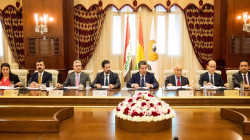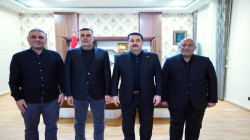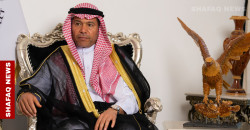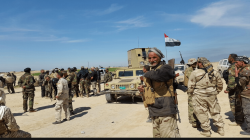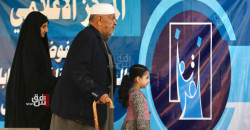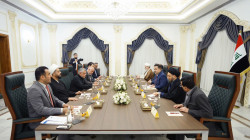Coordination Framework fractures as Al-Sudani–Al-Sharaa meeting widens the rift
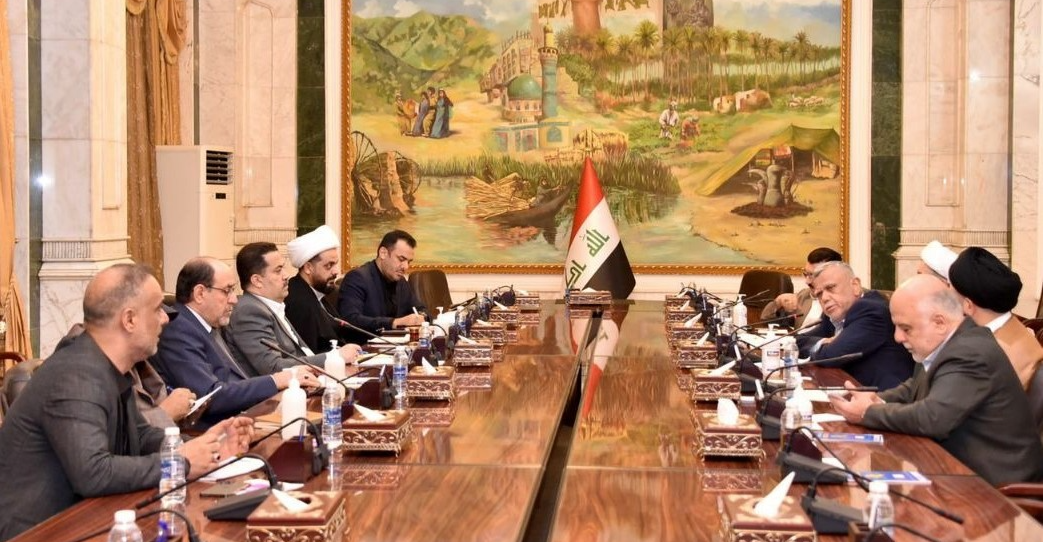
Shafaq News/ Iraqi Prime Minister Mohammed Shia Al-Sudani’s recent meeting with Syrian Transitional President Ahmed Al-Sharaa in Doha has laid bare deepening fractures within the Iraqi Coordination Framework, intensifying internal strife just months ahead of the crucial November 11 elections.
The once-unified bloc is now cracking apart. A well-placed source confirmed the Framework has fractured into three electoral camps following Al-Sudani’s announcement to run in the upcoming parliamentary elections.
"The Al-Sudani–Al-Sharaa meeting exacerbated the internal split and created an atmosphere of tension and challenge within the Framework," the source told Shafaq News Agency.
The division is stark. One camp, aligned with the current government, includes Al-Sudani himself, alongside Ammar al-Hakim, leader of the Al-Hikma Movement (Wisdom); Badr Organization chief Hadi al-Ameri; Popular Mobilization Forces head Faleh al-Fayyad; Deputy Parliament Speaker Mohsen Al-Mandalawi; and prominent politician Ahmad al-Asadi.
In opposition stands a camp openly critical of Al-Sudani’s government, fronted by former Prime Minister Nouri al-Maliki, State of Law Coalition leader; Qais al-Khazaali of Asaib Ahl al-Haq; Yasser Sakheel; and several smaller Shiite factions.
The political battleground is shifting fast. According to the same source, the weeks ahead will be telling, as new alliances stretch across sectarian lines. Al-Sudani’s bloc has reportedly joined forces with the two main Kurdish parties and influential Sunni figures, while the Gorran Movement and some smaller Sunni groups have thrown their support behind Maliki.
In the midst of the turmoil, Iraq’s Cabinet has confirmed November 11, 2025, as the date for the next legislative elections. The Coordination Framework, for its part, convened on April 9 to strategize over forming stronger electoral alliances and crafting shared policies that, according to another source, aim to “serve Iraq’s interests.”
Born out after Iraq’s 2019 protest movement, the Coordination Framework quickly rose to become the dominant Shiite coalition, tasked with selecting the prime minister under Iraq’s sectarian quota system. Initially including all Shiite factions — even the powerful Sadrist Movement — the bloc suffered an early defection when cleric Muqtada al-Sadr pulled out and later rebranded his faction as the "Patriotic Shiite Movement."
Normal Situation
Political analyst Aed al-Hilali dismissed the growing fractures as a “normal consequence” of a coalition built on shifting political sands.
"The Framework was never a single party or current. It was formed from an agreement between various Shiite forces," he told Shafaq News, arguing that such rifts are bound to emerge during elections.
"Electoral competition compels everyone to form political alliances or run as individual forces. Therefore, the Framework’s division is expected and natural," he added.
Al-Hilali also casts a positive light on the controversial Al-Sudani-Al-Sharaa meeting, calling it a potential turning point in Iraq-Syria relations. With shared security concerns and regional stakes, the analyst praised the Qatari invitation as "very important," noting that Baghdad had set the tone for relations with Damascus based on mutual respect, protection of minorities and holy sites, and border security.
He emphasized the meeting’s strategic value in terms of intelligence-sharing and anti-terrorism coordination — a point aligned with Iraq’s recent troop deployments to the Syrian border to prevent extremist infiltration.
On the secrecy of the meeting, Hilali downplayed any notion of surprise. "The Prime Minister does not act unilaterally. He is part of a political alliance that backed his rise to office," he said.
Though the meeting reportedly took place last Tuesday, it wasn’t revealed until Thursday. Baghdad has yet to issue an official statement, while the Syrian presidency confirmed the talks.
Sources say Al-Sudani used the meeting to reaffirm Iraq’s close watch over Syrian developments, particularly Israeli military activity on Syrian soil. He also reiterated Baghdad’s consistent call for an inclusive political process in Syria, the protection of religious and ethnic communities, and the safeguarding of sacred sites — especially in light of recent incidents involving the Alawite minority.
This marks the first direct meeting between Al-Sudani and Al-Sharaa, though the latter has met with several Iraqi officials in recent months. Just weeks ago, Syrian Foreign Minister Asaad al-Shibani visited Baghdad and held talks with key Iraqi leaders.
But the Doha summit has stirred a political backlash. Just as Al-Sharaa’s invitation to the upcoming Arab League summit in Baghdad had sparked debate, his meeting with Al-Sudani triggered sharp criticism from some Coordination Framework lawmakers, who accused Al-Sharaa of past involvement in terrorist activities in Iraq. Others, however, welcomed the dialogue as a necessary diplomatic step toward regional stability.
Now, as rifts widen and alliances shift, the Coordination Framework faces a critical test. Is this the beginning of its disintegration as a unified political force? Or will it weather the storm and avoid turning internal disputes into full-blown electoral rivalry?
For now, the answer remains uncertain — and the next chapter will be written by the region’s rapidly evolving dynamics.
